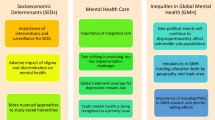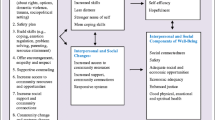Abstract
Disasters have been associated with both acute and prolonged distress and significant post-disaster psychiatric symptoms. These outcomes may be further complicated by extended periods without vital services and supplies, such as electricity and drinking water. The present study investigated the relations between post-disaster loss of services and psychiatric symptoms in urban/non-urban disaster victims. Random-digit–dial methodology was used to interview 1,249 victims of Hurricane Ike, a strong storm that hit Galveston, TX in 2008. Findings demonstrated significant relations between loss of services and post-disaster symptoms of posttraumatic stress disorder (PTSD), depression, and worry. These relations varied by urban/non-urban settings; there were significant positive relations between loss of services and symptoms of depression in non-urban settings, but not in urban settings. Similarly, a stronger relation between loss of services and symptoms of PTSD also was demonstrated in non-urban compared to urban settings. Findings highlight the potential importance of pre-disaster preparation, post-disaster restoration of services, and post-disaster community support in post-disaster psychiatric outcomes, with a particular emphasis in non-urban settings.

Similar content being viewed by others
References
Adams, R. E., & Boscarino, J. A. (2006). Predictors of PTSD and delayed PTSD after disaster: the impact of exposure and psychosocial resources. The Journal of Nervous and Mental Disease, 194, 485–493.
Baker, E. J. (2011). Household preparedness for the aftermath of hurricanes in Florida. Applied Geography, 31, 46–52.
Blanchard, E. B., Jones-Alexander, J., Buckley, T. C., & Forneris, C. A. (1996). Psychometric properties of the PTSD Checklist (PCL). Behaviour Research and Therapy, 34, 669–673.
Caruana, C. (2009). Life in the aftermath: a summary of the literature on individual and family functioning following natural disasters. Family Relationships Quarterly, 14, 3–7.
Centers for Disease Control and Prevention. (2008). Hurricane Ike rapid needs assessment. Morbidity and Mortality Weekly Report, 58, 1066–1071.
Cheung, Y. B., Liu, K. Y., & Yip, P. S. F. (2007). Performance of the CES-D and its short forms in screening suicidality and hopelessness in the community. Suicide & Life-Threatening Behavior, 37, 79–88.
Davidson, J. R. T., & McFarlane, A. C. (2006). The extent and impact of mental health problems after disaster. The Journal of Clinical Psychiatry, 67, 9–14.
Delucchi, K. L., & Bostrom, A. (2004). Methods for analysis of skewed data distributions in psychiatric clinical studies: working with many zero values. The American Journal of Psychiatry, 161(7), 1159–1168.
Edwards, M. C., Cheavens, J. S., Heiy, J. E., & Cukrowicz, K. C. (2010). A reexamination of the factor structure of the center for epidemiologic studies depression Scale: is a one-factor model plausible? Psychological Assessment, 22, 711–715.
Foa, E. B., Stein, D. J., & McFarlane, A. C. (2006). Symtomatology and psychopathology of mental health problems after disaster. The Journal of Clinical Psychiatry, 67, 15–25.
Freedy, J. R., Saladin, M., Kilpatrick, D. G., Resnick, H. S., & Saunders, B. E. (1994). Understanding acute psychological distress following natural disaster. Journal of Traumatic Stress, 7, 257–273.
Gros, D. F., Antony, M. M., Simms, L. J., & McCabe, R. E. (2007). Psychometric properties of the State-Trait Inventory for Cognitive and Somatic Anxiety (STICSA): comparison to the State-Trait Anxiety Inventory (STAI). Psychological Assessment, 19, 369–381.
Gros, D. F., Simms, L. J., & Acierno, R. (2010). Specificity of posttraumatic stress disorder (PTSD) symptoms: an investigation of comorbidity between PTSD and depression in treatment-seeking veterans. The Journal of Nervous and Mental Disease, 198, 885–890.
Gros, D. F., Price, M., Magruder, K. M., & Frueh, B. C. (2012). Symptom overlap in posttraumatic stress disorder and major depression. Psychiatry Research.
Kaniasty, K., & Norris, F. H. (1993). A test of the social support deterioration model in the context of natural disaster. Journal of Personality and Social Psychology, 64, 395–408.
Kim, Y., & Kang, J. (2010). Communication, neighborhood belonging and household hurricane preparedness. Disasters, 34, 470–488.
McFarlane, A. C. (2005). Psychiatric morbidity following disasters: Epidemiology, risk, and protective factors. In D. Meyers & D. F. Wee (Eds.), Disaster mental health services: a primer for practitioners (pp. 37–63). New York, NY: Routledge Press.
Meyer, T. J., Miller, M. L., Metzger, R. L., & Borkovec, T. D. (1990). Development and validation of the Penn State worry questionnaire. Behaviour Research and Therapy, 28, 487–495.
Molina, S., & Borkovec, T. D. (1994). The Penn State Worry Questionnaire: Psychometric properties and associated characteristics. In G. C. L. Davey & F. Tallis (Eds.), Worrying: perspectives on theory, assessment, and treatment (pp. 265–283). New York: Wiley.
Neal, D. J., & Simons, J. S. (2007). Inference in regression models of heavily skewed alcohol use data: a comparison of ordinary least squares, generalized linear models, and bootstrap resampling. Psychology of Addictive Behaviors, 21(4), 441–452. doi:10.1037/0893-164x.21.4.441.
Norris, F. H. (2002). Disasters in urban context. Journal of Urban Health, 79, 308–314.
Norris, F. H., Friedman, M. J., Watson, P. J., Byrne, C. M., Diaz, E., & Kaniasty, K. (2002a). 60,000 disaster victims speak: part I. An empirical review of the empirical literature 1981–2001. Psychiatry, 65, 207–239.
Norris, F. H., Friedman, M. J., & Watson, P. J. (2002b). 60,000 disaster victims speak: Part II. Summary and implications of the disaster mental health research. Psychiatry, 65, 240–260.
Ormond, B. A., Zuckerman, S., & Lhila, A. (2000). Rural/urban differences in healthcare are not uniform across states. A report prepared for Assessing the New Federalism. (Series B, No. B-11).
Orsillo, S. M. (2001). Measures for acute stress disorder and posttraumatic stress disorder. In M. M. Antony, S. M. Orsillo, & L. Roemer (Eds.), Practitioner’s guide to empirically based measures of anxiety (pp. 255–307). New York: Springer.
Pollack, S., Bruce, P., Borenstein, M., & Lieberman, J. (1994). The resampling methods of statistical-analysis. Psychopharmacology Bulletin, 30, 227–234.
Radloff, L. S. (1977). The CES-D scale: a self-report depression scale for research in the general population. Applied Psychological Measurement, 1, 385–401.
Ruggiero, K. J., Ben, K. D., Scotti, J. R., & Rabalais, A. E. (2003). Psychometric properties of the PTSD Checklist – Civilian Version. Journal of Traumatic Stress, 16, 495–502.
Ruggiero, K. J., Gros, K. S., McCauley, J. L., Resnick, H. S., Morgan, M., Kilpatrick, D. G., & Acierno, R. (2012). Mental health outcomes among adults in Galveston and Chambers counties after Hurricane Ike. Disaster Medicine and Public Health Preparedness, 6, 26–32.
Acknowledgements
This study is supported by National Institute of Mental Health Grant R34 MH77149 (PI: Ruggiero). Several authors are core and affiliate members of the Ralph H. Johnson VAMC Research Enhancement Award Program (REA08-261; PI: Leonard Egede, M.D.). Dr. Price is supported by T32 MH018869. The views expressed in this article are those of the authors and do not necessarily reflect the position or policy of the Department of Veterans Affairs, NIMH, or the United States government. We would like to thank the many victims of Hurricane Ike who participated in this project and Mark Morgan and Daniel Loew at Abt SRBI for their help with completing the interviews. There are no conflicts of interest to disclose.
Author information
Authors and Affiliations
Corresponding author
Rights and permissions
About this article
Cite this article
Gros, D.F., Price, M., Gros, K.S. et al. Relations between Loss of Services and Psychiatric Symptoms in Urban and Non-Urban Settings following a Natural Disaster. J Psychopathol Behav Assess 34, 343–350 (2012). https://doi.org/10.1007/s10862-012-9290-9
Published:
Issue Date:
DOI: https://doi.org/10.1007/s10862-012-9290-9




